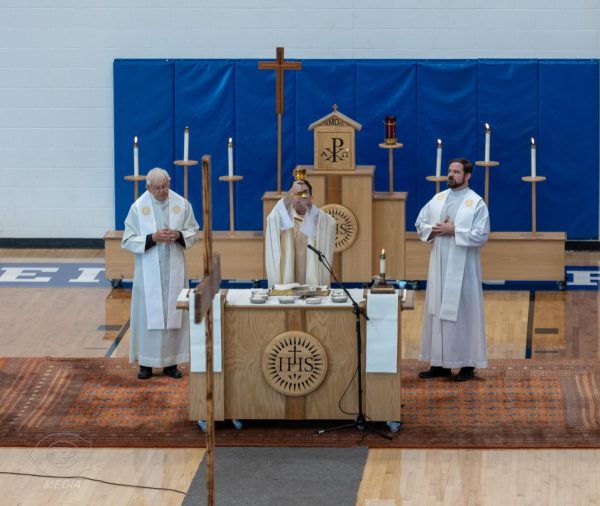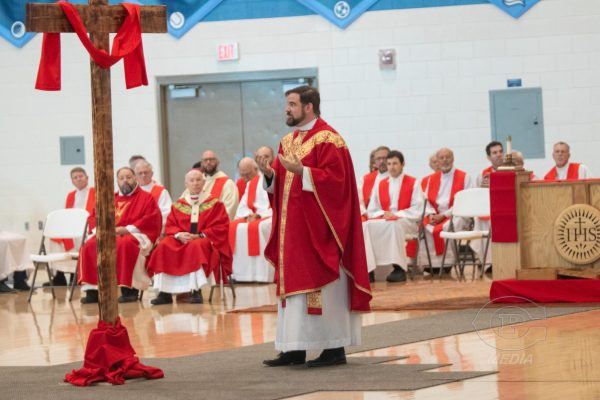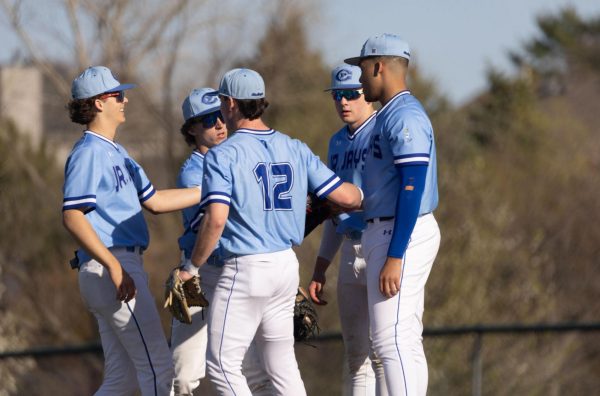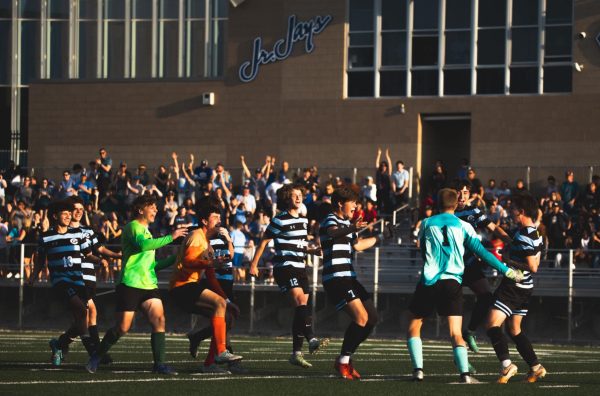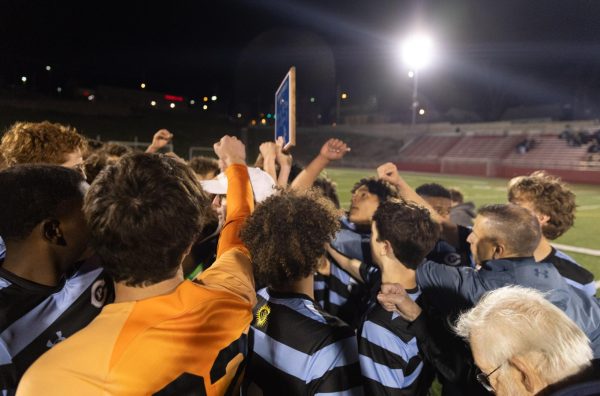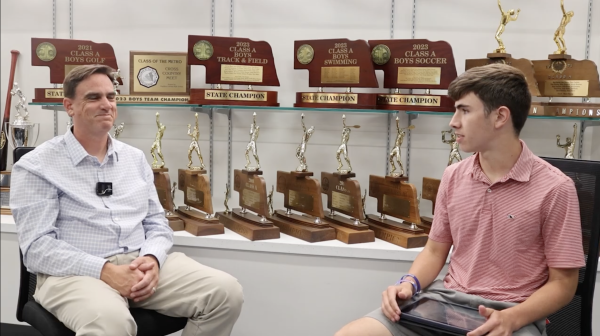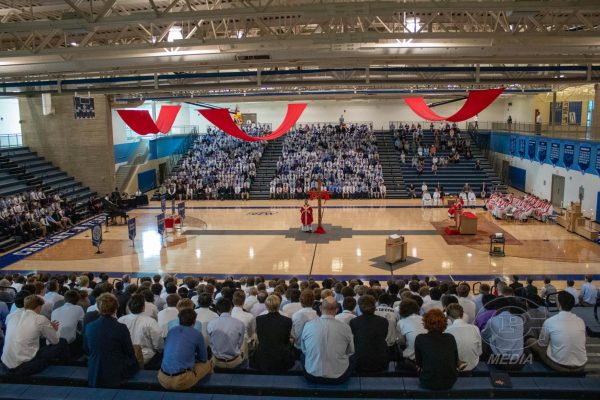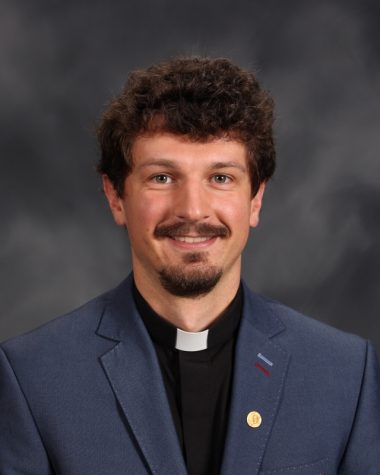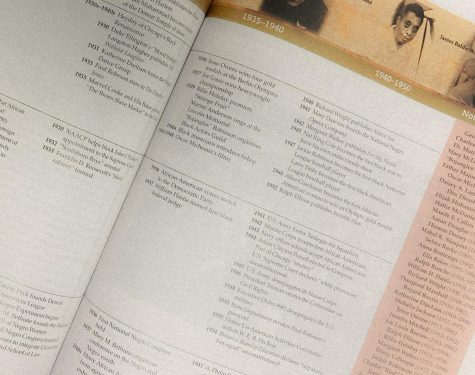Q&A: Principal Jim Bopp’s Vision for the Future of Creighton Prep
The Jay Journal recently sat down with Creighton Prep Principal Jim Bopp to discuss his first semester at the school and his vision for the future of Creighton Prep. Bopp became principal in the summer, taking over for the retiring Jim Naatz. Bopp previously served as assistant principal for Technology and Instruction at Brophy Prep in Phoenix.
Jay Journal: How are you and your family liking Omaha thus far?
Bopp: It’s been good, it’s been a super welcoming city for us. It definitely feels much different from Phoenix in many ways, not just the climate but also just the size of the city itself, and the city has a really good big small town feel to it, so that’s what we are both used to.
Jay Journal: What is different about Prep as compared to Brophy?
Bopp: In many respects, it’s easier to talk about what is similar, with both being all-boys, Jesuit, Catholic schools of a thousand plus. The transition from Brophy to Prep has been a pretty smooth one, because it is the same vocabulary, the same mission, values and dynamics in the school. The schools and buildings are in different cities but the spirit and the sense of community and the mission are pretty similar.
Brophy is a little bigger, but Creighton Prep is more integrated in the community. When I am out and about and someone asks what I do, and I tell them I’m at Creighton Prep, it seems that at least three times out of four, they always have a ton of stuff to tell me about Prep. Usually their dad went there or their brother went there or they’ve just heard something about it, so I always find people really responsive to the fact I’m at Creighton Prep, and you can usually see them light up and want to talk about it.
Jay Journal: Could you share some details from the strategic plan for the future?
Bopp: In terms of talking big-picture, it is a twelve year plan for the future, which takes Prep to its 150 year anniversary. With that in mind, they called together all the faculty and staff, and had a long day of collaboration of thinking and dreaming of what we wanted the school to look like, so every faculty member contributed what they thought about where Creighton Prep should be. We gathered up the information, and then the Board of Trustees worked to create six primary categories or areas of emphasis.
The first major goal is innovative learning. The idea is that we will create a STEAM innovation lab here, where guys will be able to learn and start to work with three areas of technology: computer-aided drafting (CAD), coding and about circuitry. With those three things, we’ll have a new set of tools in place, with 3-D printers, laser cutters, CNC routers, all different kinds of electronics, and with that they will not only be able to sciene and technology, but also creative, innovative problem-solving, and they can especially involve themselves in artistic expression. A lot of the work is involved with engineering and robotics, but it is also involved with art and ways to do art differently. Those are important 21st century skills, and the change in emphasis is going to be, ‘how do we help students be create and innovative problem-solvers?’. This will be connected to a sense of social entrepreneurship, for example, if someone goes to the Dominican Republic on a service trip, he comes back and can say, ‘I’ll get together a team of guys and find a way to make a solar-powered water purification system’. They can work in this space on innovating that, creating a prototype of it, and think big-picture about solving a real-world problem. We are also going to try and get our blue ribbon status [prestigious school award given by the US government], and work on leading the state in SAT, ACT and AP scores across the board.
The second category is having exceptional faculty, who are motivated to continue to pursue excellence in their craft, so we’ll look at adjusting the way we give out compensation, salaries and things like that to promote and reward faculty who continue to find out ways to improve in the classroom.
The third category is sustainable growth. Creighton Prep is making a concerted effort to make sure that anyone who wants to go here can go here, with 45 percent of students getting financial assistance. Finding ways to raise money and secure funds to keep tuition low is certainly a major goal.
The fourth category is continuing to foster a more inclusive environment. Loyola scholars is a good example of what we’re looking to continue and accelerate, where we go out into the community to make sure we have students and faculty and staff so the demographic is representative of the entire city of Omaha. We want to make sure that we are providing resources and raising awareness across the city that anyone who wants a Prep education, if they able, qualified and excited can come here and succeed. That means more than financial help, but also providing academic resources.
The fifth category is faith formation. We are looking at how we can make sure for students that all areas related to the Jesuit idea of a faith that does justice are integrated into the school culture, and making sure that we tie together retreats with our service learning experiences, with our liturgies and with the theology department. We would also like to create a special program for guys who go above and beyond in this category, along with a form of special recognition at graduation that they are truly representative of a larger Jesuit mission of a faith that does justice.
The last category of the strategic plan is around global impact. Helping students recognize that they are part of global society and culture, and that it benefits them to aware of it and fluent in it/ We are looking at ways to create academic partnerships with other Jesuit schools, not only across the country but across the world. The Jesuit schools are looking at looking at collaborative learning programs so that guys from Creighton Prep could end up spending a significant amount of time in Europe or Australia or Africa or South America and having an academic experience there that could a major eye-opening experience.
Jay Journal: What is the most significant part of your STEAM experience that you would like to bring to Prep?
Bopp: What excites me is that a Jesuit education has always been a Renaissance education. What I want to make sure is that every student has the ability to understand technology and the basic elements of it, in circuity, coding and CAD, then they are at a really basic disadvantage in terms of knowing the way the whole system works. We want to make sure we have students that are good at being creative and original thinkers and that when presented with a problem, they are ready and eager to learn more about the problem, work with other people on the problem, and think of creative solutions to the problem.
Jay Journal: Are you satisfied with the 1:1 program or do you believe changes are needed to be made?
Bopp: I’m coming out of a place where a 1:1 program had been in place for twelve years, so I’ve seen what it can look like after a decade of use. I think it’s important for everybody to understand that we are just getting it off the ground, so there’s definitely room for growth and improvement. That’s not faulting anybody here, that’s just the reality of what it takes to make such a monumental shift in the way we go about doing teaching and learning. It takes a significant amount of time, investment, energy and resources for this program to meet its full potential. I am anxious and eager to work with the faculty on how we can use 1:1 to accelerate the level of active learning and personalize the educational experience. It is a process that takes a significant amount of time, it didn’t happen there [at Brophy] overnight, it took 5, 6, 7 years for teachers, students and parents to become comfortable with taking full advantage of those tools.
Jay Journal: What are your thoughts on the drug testing program?
Bopp: I think it’s a really bold and brave move that the Prep administration made to implement that program. I think we are one of two Jesuit schools right now that are doing it, and I know that many other Jesuit schools will adopt it and that many other Catholic schools around Omaha will adopt it. I think that school officials and parents believe this a great opportunity to help kids make great, healthy choices. The thing with drugs and alcohol is that they are very insidious problems, and once you start down that path, it can be really hard to right the ship and turn things around. Our fundamental focus is making sure that we give students a reason to say no at all times and never to start. All the evidence suggests that if you can get to 21 without ever using drugs and alcohol that your likelihood of ever becoming addicted to those things drops off dramatically. I think that the design that they have, with the three strikes policy is a really good setup, that the first time around it is not a disciplinary issue, it is a counseling issue, and Prep works really hard to make sure they provide the resources for students and families to step back and reevaluate their choices before making it have any disciplinary consequences. I’m in favor of it, I think it has potential and that it’s already doing a lot of good and I know other schools will start to adopt it as well.
Jay Journal: What are your thoughts on expanding the counseling department, particularly in the area of a mental health professional?
Bopp: I think we have a great counseling department where the counselors are well-trained and well-versed in a wide variety of things a counselor should be responsible for, everything from mental health, to navigating high school, to preparing for college. I’ve been really impressed with our counseling department’s ability to take on a wide variety of goals as individual counselors. I do know that mental health and mental health awareness is becoming an increasingly demanding issues for schools and an arena where there seems to be more and more need, so I do think that’s something we’ll have to keep a very close eye on.
Jay Journal: Are there any areas of the curriculum you feel need an overhaul?
Bopp: No, nothing jumps out as needing an overhaul. In terms of a top-down restructuring, I’m not worried about that part at all. I think Prep is in a great place, it’s a great institution, it’s the best school in the state, and I think in the Jesuit tradition of pursuing the magis, we can always keep moving the dial and getting better, but I don’t have a sense of anything needing a complete overhaul. I think every department and every program is doing great work, and it’s just a matter of continuing to pursue the magis.
Jay Journal: Are there any specifics you’d like to share about your vision for the future at Prep?
Bopp: I really think it’s important for us to always keep a focus on the fact that students come here and parents send their sons here because they know that this is more than just an educational opportunity. I like to use the word “formation”, that people are coming to Prep because they want to participate in a formation process and they want to grow.
Jay Journal: Do you have any other thoughts you’d like to share with the student body?
Bopp: I have been impressed by what Prep means to this community and how much graduates love Prep. Having been at Prep and in the building for six months, I can see why that’s the case and I can see that reality on a day-to-day basis and it’s really encouraging and exciting for me to be a part of that experience. I’ve been deeply impressed by the student body and their commitment to getting a good education and carrying out the mission values of the school.



